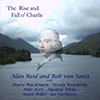A tragedy that could have been avoided.
On April 16, 1746 a pitched battle was waged on the fields of Culloden. On one side was the Jacobites who fought for Bonnie Prince Charlie. Charles Edward Stuart, also known as the Young Pretender, was the son of James Frances Edward Stuart (the Old Pretender) and the grandson of James II and IV (i.e., the second James of England and Ireland and the fourth James of Scotland). James II, a Catholic, was deposed from the throne in the Glorious Revolution of 1688 and replaced by William III of Orange, a Protestant and his son-in-law. After fleeing England, James II and IV maintained his claim to the throne through the "Divine Right of Kings" - a claim that was a rallying cry for his grandson Charlie years later.
Charlie was raised in a life of privilege in Rome, Italy. He grew up in a proud and confrontational family that constantly argued for their royal standing. His father, James Frances Edward Stuart, made several attempts to reclaim the thrones of England and Scotland. He attempted to land ships in the Firth of Forth in 1708 but was turned away by Admiral Byng and bad weather. The Old Pretender successfully landed at Peterhead in December 1715, but the success was short-lived. Fearful of the approaching government armies he fled in February 1716. This disillusioned the rebel allies who took their name from the Latin form of James - Jacobites (Iocabus). Though disillusioned, the Jacobite cause did not fully fade.
In 1745 Charles began earnest attempts to reclaim the throne with his campaign starting in Scotland. The Jacobites were emboldened by their victory at Prestonpans over the hapless General Sir John Cope, "Johnnie Cope." A brief campaign in northern England was followed by a retreat back to Scotland and victory at the Battle of Falkirk Muir. This was to be the last major victory for the Jacobites.
The English forces were now led by the Duke of Cumberland, the son of King George II. Though young, he was skilled in military command. He was also ruthless. Over several months his disciplined and well-supplied forces made their way to Aberdeen in the Scottish Highlands. There they continued their training and drills, re-stocked and re-armed.
The Jacobite army was led by a contingent of officers that assimilated leaders of the various clans who held dissenting opinions on tactics, goals, and whether the battle planned for Culloden should go forward. The infantry was largely comprised of impoverished farmers who had little choice but to fight. Their subsistence farming was dependent on access to the land; access to the land became dependent upon supplying enough young men to fight. Very few in the officer and infantry ranks had experience in battle. They were poorly armed and poorly supplied. Charlie showed little interest in the state of these forces.
The two armies moved toward Culloden. The Jacobite leaders attempted a surprise night attack; it was poorly planned, men became lost in the boggy fields, the infantry was exhausted, and the meager supplies were further depleted. Regardless, Charlie insisted on the pitched battle going forward that same day. The English army was in formation, in good spirits due to a feast (in honor of Cumberland's 25th birthday) the night before, and fully armed.
The Duke of Cumberland knew he had a tactical advantage with the preparedness of his forces and with their location on the fields of Culloden. He had his artillery target the Jacobites and the Jacobites, poorly armed, could not return the volleys. Charlie, believing Cumberland would order his men to advance, waited vainly through the early parts of the day and casualties mounted. Eventually, with tensions and uncertainty growing, the Highland infantries were ordered to charge.
It was a disaster. The Jacobites had not properly surveyed the battlefield and several regiments became mired in bogs. The Highlanders who moved around the bog were badly out-armed and were slaughtered. Charlie and his officers left their right flank exposed and Cumberland deftly directed artillery, protected by a wall, to take advantage of this weakness. The battle endured for little more than an hour and the Jacobite army was routed. The English forces suffered few casualties.
No quarter was given on the battlefield and many wounded Jacobites were killed on the field. Many of those taken prisoner were housed in atrocious conditions and later died from their wounds, malnutrition, or exposure. Cumberland was no more merciful to the crofters, farmers, families, and others living in the Highlands. Many were indiscriminately slaughtered even though they had not taken part in the battle. Cumberland became known as "The Butcher."
Charlie had fled the battlefield once he saw that defeat was imminent. He took much of the money that had been intended to outfit and supply the regiments. He later landed in France and sank into alcoholism while continuing his claims to the throne. He briefly returned to London to conform to Protestantism; if he could not gain the throne as a Catholic then he would attempt to do so as a Protestant. He never returned to Scotland and to those that had been loyal and had sacrificed for him.






